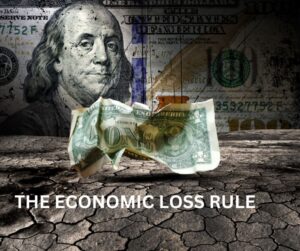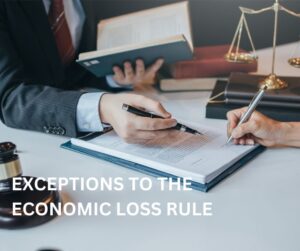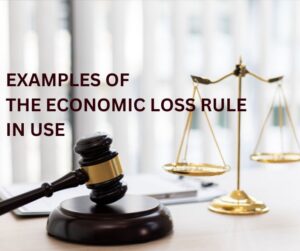In the intricate world of contract and tort law, the Economic Loss Rule plays a crucial role in delineating the boundaries between contractual disputes and tort claims. This legal doctrine prevents parties from circumventing the agreed-upon terms of a contract by barring recovery of purely economic losses through tort actions when a contractual relationship exists.
In Texas, understanding this rule is essential for businesses and legal professionals alike, as it significantly influences how disputes are resolved in both civil and commercial contexts. This blog post explores the Economic Loss Rule in Texas, shedding light on its applications, implications, and the critical distinctions it enforces in legal proceedings.
Understanding the Economic Loss Rule

What is the Economic Loss Rule and why is it important in Texas law? In Texas, the Economic Loss Rule is important because it maintains the integrity of contractual agreements by ensuring that the parties resolve disputes based on the provisions they initially agreed upon. It underscores the principle that contractual relationships should dictate the remedies and liabilities of the parties involved, encouraging precision in drafting and clarity in the understanding of contractual obligations.
For businesses, recognizing when the Economic Loss Rule applies is fundamental. One should always review contractual agreements and the nature of any arising disputes to determine whether this rule might limit the scope of possible claims. If your business operations are in Texas, consider structuring contracts to explicitly define the rights and remedies available in the event of a breach. This can help avoid the complexities and uncertainties of tort-based claims for economic losses.
Application of the Economic Loss Rule in Texas
In Texas, the application of the Economic Loss Rule varies depending on whether the context is contractual or involves a tort claim. In the realm of contract law, the rule prevents parties from seeking tort damages for failures that are essentially contractual breaches. For instance, if a service provider fails to deliver services in accordance with a contractual agreement, the client cannot pursue tort claims like negligence for mere non-performance under the terms of the contract.
How does Texas distinguish between contract and tort claims under the Economic Loss Rule? Texas law is particularly discerning in distinguishing between these claims. For a tort claim to be valid in the presence of a contractual relationship, there must be a tort independent of the contract breach itself, such as fraud or misrepresentation. These are considered torts in their own right and can thus be pursued separately from the contract.
When drafting contracts or dealing with disputes, businesses should work closely with legal counsel to ensure that any potential economic losses that could arise from contractual breaches are adequately addressed within the contract itself. Legal experts can offer invaluable advice on incorporating terms that clearly define what constitutes a breach and the remedies thereof, which can prevent reliance on tort claims to address contractual issues.
Business Torts vs Contract Law and the Economic Loss Rule
A business tort claim involves wrongful acts committed against a business that result in harm or interference with the business’s rights, often including actions like fraud, misrepresentation, and unfair competition, independent of any contract.
In contrast, a breach of contract claim arises when one party fails to fulfill their obligations as specified within a legally binding agreement.
The Economic Loss Rule is important in distinguishing these claims because it prevents parties from circumventing contract law to seek tort damages for losses that are purely economic and stem directly from a breach of contract, thereby maintaining clear boundaries between contractual obligations and tortious conduct.
Exceptions to the Economic Loss Rule

What are the exceptions to the Economic Loss Rule in Texas? Notably, in cases involving professional negligence (e.g., errors made by an architect or engineer), Texas courts have allowed parties to recover economic losses under tort theories even in the presence of a contract. Similarly, in product liability cases, consumers may seek tort damages for defective products that cause economic loss, regardless of any existing contractual relationship with the manufacturer or seller.
Businesses should consult with a business law firm to understand these exceptions thoroughly. This understanding can help in assessing the risks associated with providing professional services or products and in tailoring contracts to minimize potential liabilities. Engaging a lawyer early in the contract drafting or review process can help navigate these complexities effectively.
Affirmative Defenses to the Economic Loss Rule
Economic Loss Rule Examples and Legal Precedents

Can you give examples of how Texas courts have applied the Economic Loss Rule?
One pivotal case is the decision from the Texas Supreme Court in Lan/STV v. Martin K. Eby Construction Co., where the court held that a contractor could not recover increased costs in a construction project under tort theories because the economic losses were subject to a written contract. This case underscored the rule’s application in preventing the bypass of contract stipulations through tort claims.
For businesses, staying informed about such landmark cases is crucial. They can offer valuable lessons on how courts may view similar disputes, influencing how contracts should be drafted and how disputes might be resolved. Regularly reviewing recent legal developments with your attorney can keep your business well-prepared to handle such issues.
Summarizing the Economic Loss Rule in Texas Law
The Economic Loss Rule in Texas is a foundational legal doctrine that delineates the boundary between contract and tort claims regarding economic losses. Its proper understanding and application are vital for maintaining the sanctity of contractual agreements and for navigating the legal landscape of business disputes. By adhering to the principles outlined in this rule, and with the guidance of skilled business lawyers, businesses can effectively manage their contractual relationships and mitigate potential legal challenges.
Find Business Litigation Attorneys
If you’re navigating complex contract issues or facing potential disputes, consider reaching out for professional legal advice from a business lawyer. Ensuring that your contracts are well-crafted and that you are fully informed about the implications of the Economic Loss Rule can protect your business interests and foster more stable commercial relationships.
